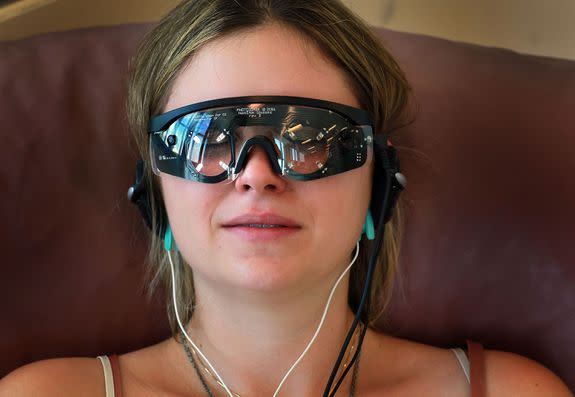How weird sleep schedules can affect our mental health

Much like a clock on the wall, our cells have their own 24-hour timeline. When they're in sync, our body clock may act as a protective barrier against mental and physical illnesses.
But throw in some jet lag, a night shift or a bout of insomnia, and suddenly the clock's hands are spinning out of control — potentially leaving us more vulnerable to viral infections and depression, scientists say.
SEE ALSO: Our lack of sleep is costing the world billions of dollars
Richard Friedman, a professor of clinical psychiatry at Weill Cornell Medical College, recently recalled a U.S. patient who suffered from manic depression. The man became depressed after returning from a trip to Europe, but seemed to snap out of it after a fun trip out West.
His post-Europe mood changes, it turned out, weren't caused by the back-to-reality blues. "The problem turned out to be a disruption in his circadian rhythm," Friedman wrote in an op-ed in the New York Times Sunday Review.
"He didn’t need drugs; he needed the right doses of sleep and sunlight at the right time," the psychiatrist wrote. "It turns out that that prescription could treat much of what ails us."
That's not to say restoring your internally driven cycles will rid you of depression or make you immune to the flu. But a growing number of studies in recent years indicate that maintaining our internal rhythm is important for our overall health.
Our circadian rhythm represents the biochemical and physiological processes that rise and fall over the course of 24 hours, including those related to hormones, body temperatures and eating and digesting food.
Friedman pointed to a 2001 study that illustrated the link between sleep, sunlight and mood. In Milan, a team of psychiatrists noticed that hospitalized bipolar patients who stayed in rooms with views of the east were discharged earlier than patients with westward-facing rooms.
Francesco Beneditti and his colleagues surmised that early morning light worked as a natural antidepressant. "Natural sunlight can be an underestimated and uncontrolled light therapy for bipolar depression," the researchers wrote.
For some people, these circadian disruptions may be baked into their genes, according to a 2013 study by scientists in California, Michigan and New York.
Researchers found that people without depression, the gene activity in their brains aligned with the usual solar day: active and alert when the sun is out; at rest during the dark hours. But in patients with severe depression, their pattern of gene activity was not synchronized with sunlight. In some, their "day" pattern looked more like a "night" pattern, and vice versa.
For these reasons, doctors worldwide are increasingly exploring the benefits of "chronotherapy," which involves gradually exposing patients to bright lights in the morning to align their 24-hour circadian rhythm with the solar day.

Image: JOE RAEDLE/Getty Images
Boosting magnesium in your diet may also help adjust your internal clock. A series of experiments in 2016 revealed that magnesium may play an "unexpected role" in helping our bodies adapt to the rhythms of night and day, researchers in Scotland and England found.
In the New York Times op-ed, Friedman said he already uses light and melatonin to help his patients readjust their circadian rhythm and fight jet lag. Now he may try a more advanced level of chronotherapy to help treat depressed patients who don't improve with prescription medication.
"Whether chronotherapy will prove as widely effective as conventional antidepressants for serious depression is still unknown," he wrote. "But there is no question that we can relieve everyday problems like jet lag and insomnia simply by better aligning our circadian rhythms with the world around us. What could be more natural than that?"